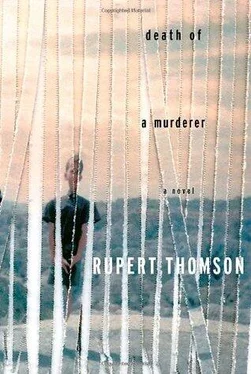“What about you?” the woman said.
He brought his eyes back to her again. She was always turning the tables on him — or trying to. The result, perhaps, of half a lifetime of being questioned by parole boards, psychologists, criminologists and priests…If she temporarily deflected attention away from herself, she would have time to marshal her thoughts, to dissemble, to conceal. Or perhaps she was simply brighter than he was. After all, she did have a degree from the Open University, which was more than he would ever have.
“Who did you love most?” she said, her face seeming to tighten around her cigarette as she inhaled.
“I’m not dead,” he said.
“So far, in your life”—and she drew the words out, mocking him for being so pedantic—“who did you love most?”
He could have said his mother too, but that didn’t seem to be the point of the question. At the same time, he felt he ought to be quick, like her. The answer wouldn’t come, though, and the longer he hesitated, the more difficult it became. He ought to know, surely. He shouldn’t have to think.
“Oh dear,” the woman said. She had a triumphant smile on her face, a smile that was almost lascivious, as if it excited her to identify weakness and uncertainty in others. “Maybe I should help you,” she said, “by mentioning a few names.”
“Like who?”
“Venetia.”
“No.” He shook his head. “No, you’re wrong.”
“You were mad about her. Anyone could see that.”
“It wasn’t love. It was—”
“You worshipped her. You would have done anything—”
“Shut up a minute, will you?”
Her look of triumph returned. He had shouted. Lost control.
“You’re not giving me a chance to think,” he said. “All this talking, all these questions.”
“Oh?” she said. “And whose idea was this?” She leaned over and dropped her cigarette into the drain. “I don’t know why I’m asking, really,” she said, straightening up again, her face a little flushed. “I already know the answer.”
“What is it, then?” If Billy sounded defiant, it was only because he was without resources; it was pure bluster.
“Raymond,” she said, looking off to one side, as though it was so obvious, so plain for all to see, that she didn’t even have to meet his gaze. “Raymond Percival.”
Billy let out a brief, explosive laugh, but even as he was ridiculing the idea, he saw Raymond walking ahead of him towards the reservoir, his bare back in shadow, his skin as cool and pale as peeled fruit.
“You followed Raymond everywhere,” the woman went on. “You did everything he said.” She lit another cigarette. She took her time. “You were so obedient. Even dogs aren’t that obedient.”
He shook his head, but knew that it was true.
“The way you looked at him sometimes. The thoughts you had. You never actually put them into words, but they were there, weren’t they?” She broke off to inhale. “You behaved just like a bloody girl,” she said, then laughed bitterly. “I should know.”
He stood up quickly, the legs of his chair screeching on the tiled floor. His face was burning. He could feel her watching him to see what he would do next. She was feasting on his embarrassment, his shame.
“The way you looked at him,” she said.
Turning to face the mortuary doors, he noticed a wedge-shaped gash at about waist-height. The door-frame was varnished wood, but the dent was sufficiently deep to reveal the wood’s true colour, palest yellow, not unlike unsalted butter. He touched it with his fingertips, feeling the sharp edge, the cleft. A porter had misjudged the width of the trolley he was wheeling, or a funeral director had been too cavalier with a coffin. You’d think someone could have repaired the damage, though; it wouldn’t have taken much.
Now he knew why it seemed familiar, this rough-and-ready space, so stark and practical, and so neglected: it was like all the places he had rented when he first left home, places he had shared with strangers, or else lived in by himself.
“I love my wife and daughter most,” he said.
He was silent for a moment, his fingers still touching the damaged door-frame.
“My daughter,” he said.
“Well,” she said, and her voice was rasping and dismissive, “I suppose you got there in the end.”
Three months ago, in August, there had been a night when he had woken suddenly. Not sure what had disturbed him — a noise? a dream? — he went to the bedroom window and looked out. Darkness filled the garden. To his right was the cornfield, its contours barely visible. He could see how it sloped upwards from right to left, though, and how it curved down again as it approached the woods. How, like a wave, it gathered itself and then appeared to break. But why had he woken? As he peered out into the field, something glinted, and he knew at once that Emma was there. She must have turned her head, the lenses of her glasses catching what little light there was. She had wandered out of her bedroom before, many times, but she’d never left the house. They were always careful to lock up at night. This time they must have forgotten, or else she had managed to open one of the doors herself — and yet she wasn’t usually capable of such initiative. Should he call out? No, that might startle her. He should go down, though — and quickly. If she went beyond the confines of the field, it could be dangerous. In the woods, he would never find her — and then there was the road. It was very straight, and people always drove too fast. He turned from the window.
“Who’s that?” Sue called out from the bed.
“It’s only me, love,” he said. “Go back to sleep.”
He hurried out of the room and down the stairs, stopping by the back door to pull on a pair of wellingtons. At the side of the house, he paused again. The night smelt musty, thrilling. Cow parsley, fox fur. The breath of owls.
Pushing through the long grass at the far edge of the track, he stumbled into the remnants of a wire fence. His T-shirt snagged on a post as he climbed over. He freed it and then stood still. There she was, about fifty yards away, the dark shape of her head and shoulders showing above the corn.
He began to walk through the field. “Emma?”
She swung round, her head at an angle. She seemed curious, or even sceptical, as if he were a second-rate magician and she was intent on seeing through his tricks.
“Daddy,” she said, “what are you doing?” She sounded surprised, but also disapproving.
He came to a halt a few feet from her. At times she appeared so sure of herself that she completely wrongfooted him. He had imagined that she might feel disorientated, even scared, and that he would lead her back to the safe haven of her bedroom. As often happened, though, she saw things differently. In her eyes, he was the hopeless one, the one who was out of place. He was the one who needed help.
“I came to look for you.” He didn’t sound very convincing, even to himself. He had already taken on the character she’d given him.
She extended an arm in front of her and drew it in a slow, majestic semicircle through the air. “Night,” she said, as if she owned it. As if, without her to tell him, he might not have known what it was called.
“It’s very late,” he said. “You should be asleep.”
She muttered a few rebellious words, which he didn’t quite make out, then steered a look towards the woods, her jaw jutting and determined, like an explorer preparing to strike out into uncharted territory. Billy glanced back at the house, but there was no sign of Sue. He would have to do this alone.
“Where’s Parsons?” Emma said.
“He’s at home in bed,” Billy said, “like everybody else.”
Читать дальше












